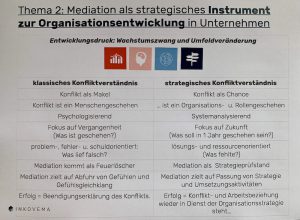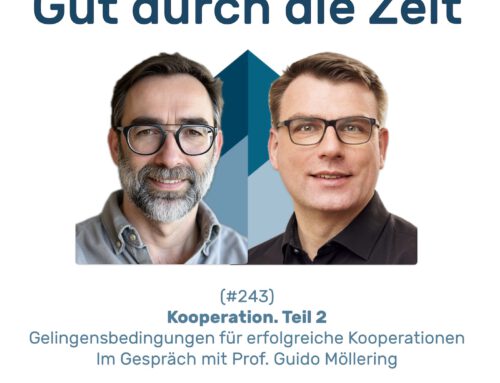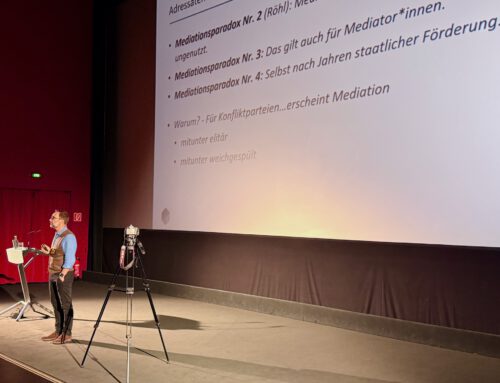Mediation in organisations. What it takes to make it work.
5 reasons for strategically orientated, future-oriented mediation.
Audio summary of the blog post:
What is mediation in organisations all about?
In principle, the application and implementation of mediation in organisations, and thus the commissioning of mediation by the organisation, updates the The tension between people and organisation, which already appears in the context of good work and the humanisation of work: Who is there for whom? Who is allowed to (exploit) whom? The individual the organisation as an instrument for the division of labour and securing a livelihood? Or the organisation the individual, for which they are remunerated? Or simply: when it comes to the question of mediation in organisations, it seems that we once again have to decide whether it is about the individual or the organisation.

Starting point 1: Tension between people and organisation
The starting point could be precisely this tangible tension between people – organisation and the humanistic demand that the organisation is created for people and not the other way round. The organisation must therefore be there for people and not people for the organisation. Orwellian fears lurk in the background, in the dark chambers of our fearful brains and their dark memories. That's why everyone usually agrees for the time being. But there seems to be a lack of clarity as to whether everyone has agreed to the same thing. Of course, an organisation is a tool and instrument for people to be able to achieve something together, to create something that individuals would not be able to do on their own. No one could have invented and built a car alone. Or a bridge. Not to mention a house, a city or even just a cupboard made of wood. The carpenter needs the blacksmith for the tools and lawyers and enforcement officers for the invention, drafting and securing of sales contracts. Long live the idea of the division of labour. The organisation is the A place where work is shared and brought together regardless of whether the organisation is called Bonbonfabrik Bonn, Badische Allgemeine Versicherung or Bäder&Becken in Buxtehude. The question is rather for whom, for which people exactly does the organisation exist? What do we mean when we all agree that organisations should be there for people and not the other way round?
Is it about people? It's about workers, owners, customers!
- Do we mean the Workers, who divide their work, coordinate, organise together to produce something as great as sweets in plastic bags, insurance policies or washbasins and baths?
- Do we mean the Owners, who take on the risk of making such advance payments, hiring workers, owing wages, setting up distribution channels and hoping that the investment will pay off?
- Or do we mean the Customerswho want to use the products and are happy that a few people have got together to plan and actually produce something or even something great?
- Can we mean all three in the mediation – and who is present?
For which people is the organisation there, for the workers carrying out the work, the owners of the organisational ideas (the organisation's ideal values) and production facilities (the organisation's material values) or the customers who want to use the organisation's products and are prepared to pay for them or provide another service in return.
These three groups of people often pursue completely different and sometimes conflicting interests, and not all of them sit at the mediation table when organisational mediation takes place.
And sometimes there are people in mediation who can unite all three (conflicting!) interests, who are employees, shareholders and customers at the same time. And sometimes this also applies to the third party.
- So, the question is raised: Who does the organisation have to be there for – and who determines this bindingly? The answer has implications for the positioning of mediation in organisations. Here it becomes understandable when system theorists (over-)emphasise in order to draw attention to this complexity, that people do not occur in organisations and in mediations are not people eitherIn mediations and organisations, the whole person does not exist and act as a humanistic ideal! The individual, the indivisible human being at its core, is not the subject and not the object in organisations and mediations. It requires a complexity-appropriate concept – both for organisations and for mediation. With the humanistic claim to channel the individual into mediation, the theory and practice of mediation must fail (Thesis 1).
- The theory must be structured in a way that is appropriate to the complexity in order to be able to depict and capture the complexity of practice. This is the challenge for a concept of „mediation in organisations“. It must hold and withstand the existing roles and role holders in tension. The idea that the organisation and the individual are in a two-pole field of tension is too simplistic and cannot cope with the complexity.
Starting point 2: Strategy
The formulation „strategically orientated mediation“ has two directions, which are different and each require your attention in the discussion, formulation and practical implementation.
It is about the strategy of the organisation and the strategy of mediation. It is not about the strategies of the people.
- On the one hand, there is a strategic element that the Strategy of the organisation plays a leading role in mediation. The organisation's strategy is the current approach to implementing the organisation's mission or vision, supports its purpose and is usually the result of an intensive strategy process.
- Secondly, the conflict can be approached strategically in mediation. As a rule, the parties involved in organisational mediation are not only in a (working) relationship with the conflict. They are role bearers of the functional structure of the organisation and have tasks to fulfil that are important for the overall result. This working relationship is part of the organisational strategy and its implementation – and therefore also accessible to strategic processing: as before, the parties involved are not achieving their common goals as employees of the organisation. The conflict makes this clear. The conflict can therefore also be dealt with in a future-orientated way, not just in a past- or present-orientated way. This in itself is not new and can be found, for example, in resource- and solution-focussed mediation concepts (Bannik). However, the emphasis should be emphasised. Mediation in organisations is an investment by the organisation in its own future.
Mediation in organisations is an investment by the organisation in its own future. This suggests that it is an organisational event and not a people event.
5 reasons for the strategic orientation of mediation in organisations
In the following I list five reasons for a strategic orientation of mediation in organisations and thus for a Organisation-related mediation.
These five reasons represent the starting point on the basis of which I would like to open the discussion. In this respect, they guide the discussion, but are admittedly not self-contained.
5 Reasons for the strategic and organisational orientation of mediation in organisations (overview)
1. mediation is paid for by the organisation. Those who pay do not have to decide against others, but their interests take priority.
2. role holders in their functions act in mediation, not people.
3. mediation is a strategy test bed, not an outsourcing of the conflict
4. mediation must address the future of the organisation.
5. mediation must be a worthwhile offer and not humanistic blackmail.
1. mediation is paid for by the organisation.
Organisations are not people. Although they are often designed like people by organisational consultants and mediators - keywords must suffice here: organisational scripts of TA theory; DNA of organisations; learning organisations - the fact remains that an organisation cannot suffer. Organisations do not suffer like people. They are not human beings. But, they are legal entities and obligated parties in the legal system. We grant them rights and obligations as independent legal entities.
In organisational mediation, this legal entity and duty bearer is usually also the client. The organisation may not be present in the mediation, only the role holders of the corresponding functional roles. However, the organisation is part of the communication in mediation and is often the cause of the conflict. As part of the third reality (Harari, Y.N., Sapiens, 2013), the organisation exists in the communicative reality of the participants. According to Luhmann's concept of communication, this communication is by no means just a conversation about the organisation, but the organisation speaks. (cf. Luhmann's communication model – here in the blog). Conceptually, the organisation may even be present here, but the decisive factor is that the organisation provides the occasion and the framework for this mediation meeting to take place at all. It therefore has a leading role in the mediation. The mediator cannot – exclude the organisation from the mediation in a kind of guerrilla tactic –. Rather, the third party is required to keep this presence-non-presence in mind. The mediator therefore not only hears the person in their role when fulfilling this role, but also the organisation speaking in the form and appearance of the role bearers.
The organisation therefore not only pays, but can also be heard in mediation and must above all be taken into account.
2 In mediation, role players act in their functions, not people.
The people who act in mediation in organisations do not appear there as people, but as role bearers.
Nevertheless – and this is just as important(!) - people also want to be perceived and taken seriously in their diversity in organisations. As human beings, we take on our work and fulfil the requirements and expectations of our functional role in our own individual way. Our individual humanity, our history, our experiences in groups, with siblings, friends and parents help us to work with others – and sometimes these experiences stand in our way.
And organisations want and encourage our complete identification with the organisation. We know the Siemens people, the Bayer people, the Ludwigshafen people from BASF from the 20th century and were proud of them. And companies like Google, Ebay and Zalando are professionalising identification measures for their employees, at least for „high potentials“.
So people in organisations and mediations are to be conceptualised?
Conceptually, however, this does not mean that people are completely free to argue and regulate in mediation…but only that the STRATEGY of the ORGANISATION must and may take people into account. But this happens within the framework of role expectations! If people fulfil the expectations of their role better, if the organisation addresses them holistically (family compatibility as a keyword), then organisations will do so: However, the basis remains the functional role. It cannot simply allow itself to offend people by not treating them individually, but must endeavour to engage and identify with them – if it expects to benefit from this.
This is precisely the reason why mediation has any chance at all in organisations as a process used by employees who are responsible for their own actions! Mediation, as an instrument of the organisation for dealing with conflicts, is interesting for organisations for precisely this reason. But Organisations act from their own logic, not from the logic of an individual.
If organisations enable conflict resolution through mediation, the message and role expectation for employees is: „The organisation expects you, dear employees, to behave cooperatively with your differences, organise yourselves and come to an agreement. So that you can do this even in delicate situations, we know that an impartial third party, a mediator, can be helpful. That's why we provide you with one. (Not indefinitely, of course, but in line with our expectations of you);,
The organisation can no longer simply order and regulate things itself if it wants to have employees who are responsible and cooperative, but must create a framework that makes this possible. Mediation is one such instrument. Or to put it another way: good, collegial cooperation and cooperative conflict management is increasingly becoming a requirement for modern companies and the focal point of good employer branding
3. mediation is a strategy test bed, not an outsourcing of the conflict
This expectation of employees also makes it clear that mediation with the help of an external mediator is not an outsourcing of conflict management. The organisation does not capitulate to the conflict and outsource its handling. Rather, it hopes that mediation will work out the best possible solution in the interests of the organisation. And this sometimes means that the employees „determine“ what is best for the organisation. Here, the interests of the organisation often coincide with the interests and wishes of the role players involved. After all, it is not uncommon for organisations to continue to fill their functional roles with specific individuals.
This consideration of the specific individuals therefore takes place within the framework of the role expectations – and therefore the conflict never simply concerns the relationship between the parties involved, but always the working relationship. This is why conflict is also a concrete strategy test bench for the organisation: Are we on the right track?
It is therefore not a classic mediation between two people. And therefore it should not focus solely on (all too human) emotions or seek a solution to the disputed conflict relationship. It requires the putting on organisational glasses so that organisational perspective is appropriately activated. The corporate and organisational strategy will, may and must play a role in mediation.
(Of course, this also means that Not every dispute between colleagues leads to mediation. The manager or an internal mediator has to deal with the emotional everyday disputes that colleagues may no longer be able to resolve. Internal mediators can be used well here and can also be understood as neutral persons. However, if company-relevant issues or processing dimensions are involved, they are no longer neutral either, but are also affected as internal mediators as part of the organisation. This is where external mediators come into their own.
Not every dispute between colleagues belongs in organisational mediation.
One example: A conflict in the team may only involve two employees. In this case, antipathies can sometimes be dealt with in mediation with an internal mediator. Or directly with the manager as part of team development. However, if it becomes clear that the entire team, perhaps even the manager, has stood by helplessly and inactively for weeks and months, the organisationally declared philosophy of cooperation is called into question. Here the concrete relationship conflict can take on the character of a team and organisational conflict can. And this is where an external mediator can be more supportive. Here, externally conducted mediation shows real Added value potential up!

4. mediation must focus on the future of the organisation
If mediation in organisations is more strategically oriented and therefore more practically future-oriented rather than emotion-focused, mediation can play out its special features and strengths in conflict resolution. The speciality of mediation does not lie in focussing on feelings and emotions, as Rosenberg's non-violent communication, for example, proclaims – and is also used in mediation. This approach also has its justified fields of application; I do not want to deny or criticise this here. On the contrary – it is an enrichment for the diversity not only of methods but also of mediation philosophies. But it does not activate the power of mediation. The innovation of mediation in conflict resolution is not the focus on emotions, which have always played a decisive role, albeit a different one. People would never have gone to war, especially not in the name of nations, without emotions and emphasising feelings.
The truly new element in conflict management through mediation is the focus on the future. And that is why the practical handling of the conflict in the Mediation towards the future in order to activate the innovative potential that mediation offers.
5. mediation must be a worthwhile offer, not humanistic blackmail
Mediation must be economically worthwhile. The only question is: for whom? In a liberal economic system, the answer is clear: it must be worthwhile for the customer. And the customer is the one who pays for it. In mediation in organisations, the organisation pays. This is not some Orwellian thing, but a (legal) personality with rights and obligations (also) towards people, other legal entities. Of course, there are differences between what a legal entity organisation still is and what a legal entity person/human being still is. But in the (system) context of law and business, both act equally.
Therefore, the mediation that the organisation pays for must also suit it. The outcome of mediation is important for the organisation and is sometimes only partially open. Such a Conditional openness towards the outcome of mediation We also find this in the human mediators, but here a certain degree of openness at the start of the mediation is sufficient, as the people actually involved in the mediation never give up control and can stop the mediation at any time. They have a continuous influence on the mediation and in the mediation.
However, the organisation, represented for example by the HR department or management, usually remains on the outside and is not directly present in the mediation. Under these circumstances, is it permissible or even necessary for the mediator appointed by the organisation, even if acting as an external party, to bring in the organisational perspective and incorporate it into the interventions (in questions, for example!)?
Perhaps the following offer supports a „Yes!“: Mediation is in itself quite an unheard-of offer. It is by no means neutral, but rather morally imbued. Mediation has long emphasised – and this can be read and seen on many mediator websites - that it is the better alternative to the law and legal disputes. Mediation considers itself to be on the morally good side. People can have their say freely here, no longer fight each other and are truly understood for the first time – and lie in each other's arms at the end, according to the predominant advertising image of mediation. And it is also cheaper than the legal process (irritating word: lawyers!).
Nevertheless, mediation – is rarely utilised in view of the large number of conflicts –. In Germany, we have seen a dramatic decline in the number of lawsuits filed with the courts for over 15 years, without the potential for conflict having disappeared so dramatically. They are simply being resolved and balanced elsewhere – but not with mediators!
Better to see a therapist or coach then!
…at least he's on the right side…!
Mediation is quite demanding and therefore has a high hurdle. Mediation is – quite soberly considered – as a product, quite a cheek. It demands quite a lot from people who currently can't stand each other, have hurt each other badly and are going through a highly fragile situation emotionally. These people are supposed to sit down at a table, start a conversation with someone who would probably be at the bottom of a conversation wish list – and pay a lot of money for it! Then why not go to a therapist or coach? At least they are on the right side in these difficult times!
Even life insurance is easier to sell!
And what does mediation offer? Little to nothing. No certainty that the unclear things will be clear afterwards, no commitment that the uncertain things will be settled bindingly afterwards, even if not completely satisfactorily. Mediation only offers the certainty that an invoice will be produced. And that time has been spent. This – and this must be made clear – is not an easy product to sell, is it? Even life insurance is easier to sell – because you know that money will flow if the worst comes to the worst!
In view of this, it is understandable that mediation has not drawn any significant added value from the fact that the number of lawsuits filed with German courts has fallen dramatically over the past 15 years. Practical mediation could not get any clearer feedback, could it? I am happy to engage in discussion and dialogue here and invite further debate. But to come back to the topic: The strategic focus makes mediation a valuable tool for organisations. The organisation does not have to calm down (from the conflict) in order to devote itself to its core business and strategy. No, it must use the disruptions and conflicts as test beds. The fine adjustments are made at full speed in the jolts and jerks of day-to-day conflict, rather than at such a high level. Because in the hour of dramatic conflicts, a space is opened up that not only prevents further heating up, but also scrutinises the situation to see whether and to what extent it affects the overall strategy or the corporate vision, calls it into question and prompts corrections.
It is not uncommon for „conflict energy“ to indicate a high level of personal commitment on the part of employees and their identification with the organisation, which should not be stifled by poor regulations. To take a typical conflict as an example: If sales and production employees threaten to wear themselves out in a personal (petty) war, then a strategic approach to conflict management in mediation with a view to the future and vision of the entire company is a worthwhile approach. This could also make it clear that the entire environment of the organisation has changed, which should be common knowledge in times of the VUCA world and digital transformation.
(Our contributions to the VUKA world and the digital transformation of organisations:
- The world is a VUCA world. So what?
- Striving for efficiency. Optimising against the walls of the VUCA WORLD.)

Note on our own behalf:
In 2019, the four modules (no. 6 – 9) of the Further training as a business and organisational mediator. Mediation in the business and labour world taught. The training is suitable for (certified) mediators who work in organisations and want to become more professional in this field. The training programme starts on 11 January and ends on 26 May. All further information can be found here.




Leave A Comment